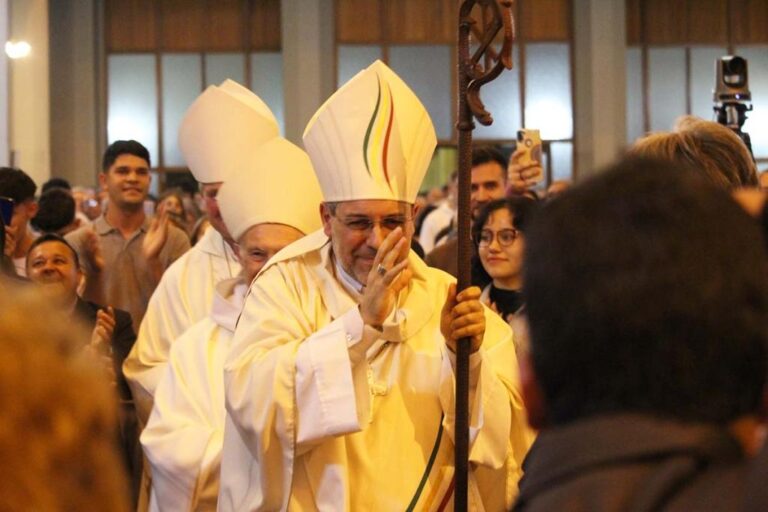Argentina’s Catholic bishops have voiced strong criticism of Javier Milei’s economic proposals, underscoring concerns about the potential social impact of his radical libertarian agenda. As the outspoken economist and presidential candidate continues to gain popularity, church leaders are urging caution and emphasizing the need for policies that prioritize the wellbeing of Argentina’s most vulnerable populations. This latest intervention from the Catholic hierarchy highlights the growing tension between Milei’s market-driven platform and the ethical perspectives held by the country’s religious institutions.
Argentina’s Bishops Condemn Javier Milei’s Economic Approach as Harmful to Social Welfare
The Argentine Catholic bishops have expressed strong disapproval of Javier Milei’s proposed economic policies, warning that his approach could severely undermine the nation’s social welfare system. In a recent statement, the episcopal conference highlighted concerns over aggressive austerity measures, deregulation, and drastic cuts to public spending. They argue these steps risk increasing poverty and social inequality, particularly affecting the most vulnerable communities. Church leaders emphasized the importance of prioritizing human dignity and the common good in economic reforms, urging policymakers to adopt a more compassionate and inclusive model that safeguards social justice.
Among their main objections are Milei’s calls to reduce government intervention and privatize essential services, which the bishops fear would limit access to healthcare, education, and social support. The bishops outlined a clear contrast between economic efficiency and social responsibility, urging caution with the following priorities:
- Protecting social safety nets to ensure the poorest citizens are not left behind.
- Maintaining public access to essential services like health and education.
- Promoting ethical economic policies rooted in solidarity, not just market liberalism.
| Issue | Bishops’ Concerns |
|---|---|
| Austerity Measures | Could increase poverty and social exclusion |
| Privatization | Risk of reduced access to essential services |
| Deregulation | May weaken protections for vulnerable populations |
Church Leaders Highlight Potential Risks of Deregulation and Market Extremes in Argentina’s Economy
Church authorities in Argentina have voiced serious concerns regarding the economic direction advocated by Javier Milei. Emphasizing the importance of social justice and the common good, bishops argue that drastic deregulation could exacerbate inequality and instability. They warn that eliminating vital state protections in favor of an unfettered market risks marginalizing vulnerable populations and undermining the social fabric. In public statements, church leaders called for cautious evaluation of policies that prioritize rapid economic liberalization over inclusive and sustainable growth.
Key concerns highlighted include:
- Increased poverty and unemployment due to unchecked market fluctuations.
- Potential erosion of labor rights and social welfare provisions.
- Heightened risk of financial speculation leading to economic volatility.
- Diminished role of government in regulating essential services.
| Economic Factor | Potential Risk | Church Recommendation |
|---|---|---|
| Deregulation | Market instability | Balanced oversight |
| Labor Rights | Job insecurity | Stronger protections |
| Social Welfare | Increased poverty | Policy continuity |
Religious Authorities Call for Inclusive Policies Prioritizing the Poor and Ethical Economic Governance
The Argentine bishops underscored the urgent need for economic frameworks that champion social inclusion and place the most vulnerable at the center of policy-making. They expressed concern that current economic proposals risk deepening existing inequalities and neglecting the ethical imperatives guiding Catholic social teaching. Emphasizing solidarity, the religious leaders called for a commitment to policies that foster shared prosperity rather than prioritizing individual wealth accumulation.
In a detailed statement, the bishops highlighted several core priorities for ethical governance, including:
- Transparent management of public resources to ensure accountability and trust.
- Support for social programs that provide education, healthcare, and housing to marginalized communities.
- Promotion of labor rights as the foundation for dignified work and economic stability.
| Key Focus | Church’s Position |
|---|---|
| Economic Growth | Inclusive and equitable, not at expense of the poor |
| Governance | Transparency and ethics above all |
| Social Welfare | Strengthening networks for vulnerable groups |
The Way Forward
As debates over Argentina’s economic future continue to intensify, the bishops’ public criticism of Javier Milei’s policies highlights the growing intersection between faith and politics in the country. Their concerns underscore the challenges ahead as Argentina seeks solutions to persistent financial instability. Observers will be watching closely to see how Milei’s proposals evolve in response to such influential voices from the Catholic Church.




